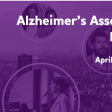An article featuring research lead by Grinberg lab post-doctoral fellow Maryana Alegro, PhD for Berkeley's Institute for Data Science (BIDS). To read the full article, see the BIDS webpage.
Mapping the human brain to combat Alzheimer's
BIDS/ICHS Data Science Fellow and Computer Scientist Maryana Alegro uses computer vision, machine learning and medical imaging to generate and analyze large-scale protein maps of the human brain. Her maps are used to develop and validate imaging biomakers for the early diagnosis and treatment of brain disease.
Alzheimer’s disease (AD) is a devastating neurodegenerative disease marked by progressive loss of cognitive function. In the last decade, Alzheimer’s disease is the only leading cause of death to have increased in frequency – nearly a 90% increase between 2000 and 2014. Currently, 5.5 million Americans have Alzheimer’s disease, and by the year 2050, this is projected to increase to nearly 13.8 million Americans, costing well over $1 trillion annually in health care. Alzheimer's is a progressive disease, meaning it starts in smaller regions of the brain and spreads as the disease persists, leading to more severe symptoms. The development of an effective treatment has been limited by the delayed timing of diagnosis...
To continue reading the full article, see the BIDS webpage.

